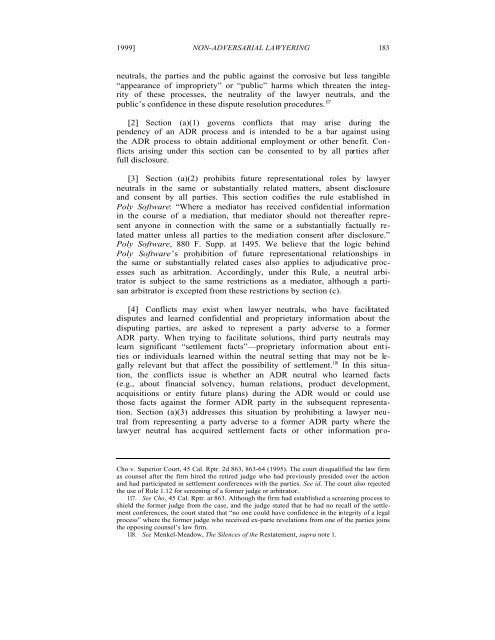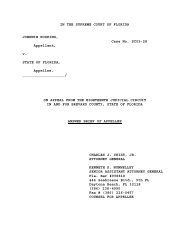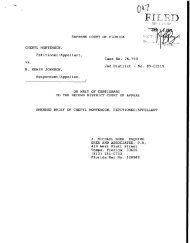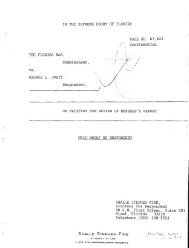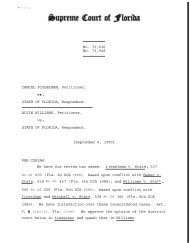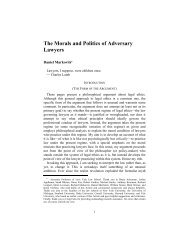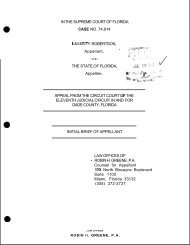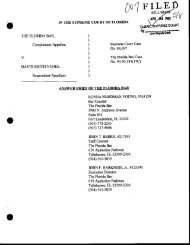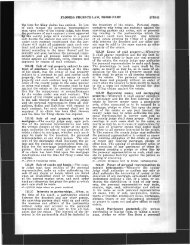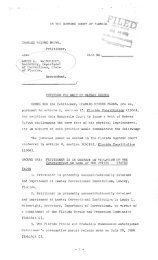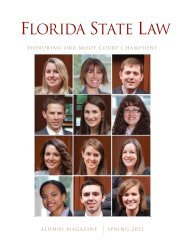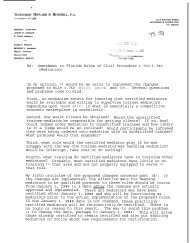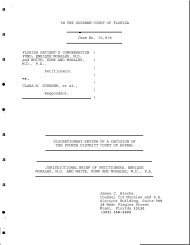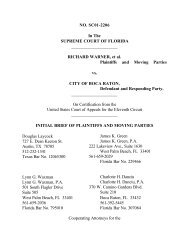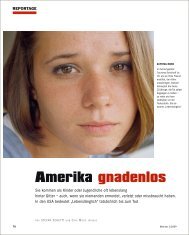ethics and professionalism in non- adversarial lawyering
ethics and professionalism in non- adversarial lawyering
ethics and professionalism in non- adversarial lawyering
You also want an ePaper? Increase the reach of your titles
YUMPU automatically turns print PDFs into web optimized ePapers that Google loves.
1999] NON-ADVERSARIAL LAWYERING 183<br />
neutrals, the parties <strong>and</strong> the public aga<strong>in</strong>st the corrosive but less tangible<br />
“appearance of impropriety” or “public” harms which threaten the <strong>in</strong>tegrity<br />
of these processes, the neutrality of the lawyer neutrals, <strong>and</strong> the<br />
public’s confidence <strong>in</strong> these dispute resolution procedures. 117<br />
[2] Section (a)(1) governs conflicts that may arise dur<strong>in</strong>g the<br />
pendency of an ADR process <strong>and</strong> is <strong>in</strong>tended to be a bar aga<strong>in</strong>st us<strong>in</strong>g<br />
the ADR process to obta<strong>in</strong> additional employment or other benefit. Conflicts<br />
aris<strong>in</strong>g under this section can be consented to by all parties after<br />
full disclosure.<br />
[3] Section (a)(2) prohibits future representational roles by lawyer<br />
neutrals <strong>in</strong> the same or substantially related matters, absent disclosure<br />
<strong>and</strong> consent by all parties. This section codifies the rule established <strong>in</strong><br />
Poly Software: “Where a mediator has received confidential <strong>in</strong>formation<br />
<strong>in</strong> the course of a mediation, that mediator should not thereafter represent<br />
anyone <strong>in</strong> connection with the same or a substantially factually related<br />
matter unless all parties to the mediation consent after disclosure.”<br />
Poly Software, 880 F. Supp. at 1495. We believe that the logic beh<strong>in</strong>d<br />
Poly Software’s prohibition of future representational relationships <strong>in</strong><br />
the same or substantially related cases also applies to adjudicative processes<br />
such as arbitration. Accord<strong>in</strong>gly, under this Rule, a neutral arbitrator<br />
is subject to the same restrictions as a mediator, although a partisan<br />
arbitrator is excepted from these restrictions by section (c).<br />
[4] Conflicts may exist when lawyer neutrals, who have facilitated<br />
disputes <strong>and</strong> learned confidential <strong>and</strong> proprietary <strong>in</strong>formation about the<br />
disput<strong>in</strong>g parties, are asked to represent a party adverse to a former<br />
ADR party. When try<strong>in</strong>g to facilitate solutions, third party neutrals may<br />
learn significant “settlement facts”—proprietary <strong>in</strong>formation about entities<br />
or <strong>in</strong>dividuals learned with<strong>in</strong> the neutral sett<strong>in</strong>g that may not be legally<br />
relevant but that affect the possibility of settlement. 118 In this situation,<br />
the conflicts issue is whether an ADR neutral who learned facts<br />
(e.g., about f<strong>in</strong>ancial solvency, human relations, product development,<br />
acquisitions or entity future plans) dur<strong>in</strong>g the ADR would or could use<br />
those facts aga<strong>in</strong>st the former ADR party <strong>in</strong> the subsequent representation.<br />
Section (a)(3) addresses this situation by prohibit<strong>in</strong>g a lawyer neutral<br />
from represent<strong>in</strong>g a party adverse to a former ADR party where the<br />
lawyer neutral has acquired settlement facts or other <strong>in</strong>formation pro-<br />
Cho v. Superior Court, 45 Cal. Rptr. 2d 863, 863-64 (1995). The court disqualified the law firm<br />
as counsel after the firm hired the retired judge who had previously presided over the action<br />
<strong>and</strong> had participated <strong>in</strong> settlement conferences with the parties. See id. The court also rejected<br />
the use of Rule 1.12 for screen<strong>in</strong>g of a former judge or arbitrator.<br />
117. See Cho, 45 Cal. Rptr. at 863. Although the firm had established a screen<strong>in</strong>g process to<br />
shield the former judge from the case, <strong>and</strong> the judge stated that he had no recall of the settlement<br />
conferences, the court stated that “no one could have confidence <strong>in</strong> the <strong>in</strong>tegrity of a legal<br />
process” where the former judge who received ex-parte revelations from one of the parties jo<strong>in</strong>s<br />
the oppos<strong>in</strong>g counsel’s law firm.<br />
118. See Menkel-Meadow, The Silences of the Restatement, supra note 1.


